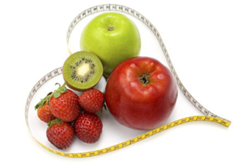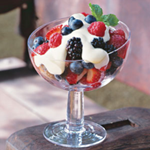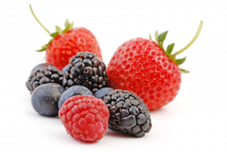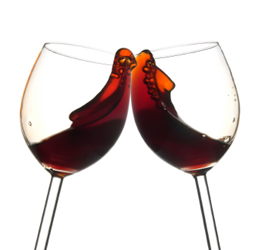August 2018 Newsletter:
This month’s hot topic to address is the benefits of consuming antioxidants. Many people have heard of antioxidants, but may not be aware of what it actually is and what it does for the body that makes them beneficial. Well, read on, and you will know all about antioxidants!

What in the heck are ANTIOXIDANTS??
An antioxidant is a dietary substance that can prevent damage to the cells in the body or repair damage that has already been done.
Damage can occur due to oxidation, which is the process of atoms loosing electrons and becoming “free radicals”. If atoms remain unstable due to the loss of an electron, they have the ability to make other atoms unstable, damaging or destroying cells. Free radicals may also be developed due to exposure to sunlight, radiation, pollution, and other toxic substances.
Antioxidants help by donating electrons to unstable atoms or by converting and excreting them out of the body. Research suggests that if the body undergoes oxidative stress, it may be the cause of the formation of medical and chronic conditions, such as cancer or heart disease.
Here’s an easy tip: Think of it antioxidants as being “against oxidation”.
Red Wine and Flavonoids
Flavonoids are water soluble molecules with antioxidant affects. They are derived from fruits, vegetables and wines. Flavonoids cause the body to reduce the oxidation of lipoproteins, especially LDL, the bad cholesterol. They also help raise HDL, which is the good cholesterol.
Consumption of flavonoids can assist in the reduction of both systolic and diastolic blood pressures, total cholesterol, and decrease stroke risks.
Many studies show that having 1 glass of red wine a day may decrease risk of coronary heart disease.
However, put your goals in perspective – Wine also has calories and may diminish ones results for weight loss. Furthermore, Red wine has also been shown to increase the risk of breast cancer. You can get flavnoids from various other food sources with less calories, and less risk of breast cancer such as citrus fruits, berries, legumes and grapes.
Nutrients as Antioxidants:
Antioxidants are found in a variety of foods, including many fruits and vegetables, nuts, grains, and some meat, poultry and fish.
Antioxidant substances are found in foods containing Vitamin A, Vitamin C, Vitamin E, Selenium, and Beta-carotene. Here are examples of foods with these specific nutrients:
- Vitamin E- Vegetable Oils, Nuts, Seeds, Soybeans, Wheat Germ.
- Vitamin C- Many fruits and vegetables, grapefruit, oranges, potatoes, broccoli, etc.
- Vitamin A- carrots, spinach, mango, milk, margarine, fortified cereals
- Beta carotene- red, orange, yellow, and deep-green foods
An Easy, Yummy Antioxidant Dessert:

All you need is fruit, brown rice cakes, and cool whip: Add 2 tablespoons of lite cool whip to one rice cake and top with ¼ cup sliced strawberries, ¼ cup blueberries, and ¼ cup raspberries.
Only 115 calories plus 9 grams whole grains
“In your body, the antioxidant process is similar to stopping an apple from browning. Once you cut an apple, it begins to brown, but if you dip it in orange juice, which contains vitamin C, it stays white.”- The American Dietetic Association
Research Suggests…
There are many studies that suggest that a high consumption of antioxidants can help reduce and delay chances of cancer development.
Antioxidants are powerful because they enhance the immune system. A strong immune system is vital for good health. Research is also concluding that antioxidants assist in the removal of precancerous cells, as well as inhibit the growth of tumors that may already be present.
By following a healthy diet, full of fruits and vegetables, you can help your body fight and prevent oxidation.
 Antioxidants are vitally important for general healthy, but for athletes they may even have additional benefits
Antioxidants are vitally important for general healthy, but for athletes they may even have additional benefits
Notes for Antioxidants and Performance.
This is an interesting concept, because it has been found that on the one hand, regular physical exercise enhances the antioxidant defense system and protects against exercise induced free radical damage. However, the level of intensity and duration also requires attention: Intense exercise, particularly in untrained individuals, overrides the defense system, resulting in increased free radical damage. Furthermore, endurance exercise increases oxygen utilization up to 20 times as compared to the resting state. Increased oxygen utilization means an increase in the generation of free radicals, with the concerning result of muscle and tissue damage.
Antioxidant supplementation has had increased awareness in the athletic community for these reasons.
Individual fitness level, intensity of exercise, and diet are among the factors determining the extent of exercise-induced free radical damage. This article focuses on how athletes can defend against the increased free radicals resulting from exercise and to determine the antioxidant supplementation that may be necessary.
Vitamin E, in particular, considered the strongest antioxidant, shows a clear protection against exercise-induced oxidative damage, . Vitamin E has also been shown to enhance recovery following intense exercise. There are some studies suggesting that vitamin C may also hasten recovery, as well, and decrease muscle soreness.
Furthermore, athletes adapting to high-altitude training (such as skiing or mountaineering), vitamin E might be a beneficial supplement because it did demonstrate reduced free radical damage and blood lactate levels in a placebo-controlled study on mountaineers.
· Your diet, could be capable of providing the necessary components for an inherent antioxidant system. Eating 5 servings of fruit or vegetables per day along with a balanced exercise program will ensure this, but for many athletes that work out longer and stronger than the average Joe, supplementation is certainly worth considering.
· Weekend warriors should strongly consider a more balanced approach to exercise. Failing that, again, consider supplementation and be reasonable about knowing the product, its purity, its bioavailability. and its research
· For extremely demanding races (such as endurance events), or when adapting to high altitude, consider taking a vitamin E supplement (100 to 200 IU, approximately 10 times the RDA) per day for several weeks up to and following the race, as well as an overall variety of antioxidants (Juice plus is a product that comes to mind, which supplies all these added benefits within its highly respected brand).
· If you do supplement, read labels and follow instructions. Do not over-supplement.
· Remember that free radicals can be generated not just by exercise but also from smog and other environmental sources. Do not exercise in areas with significant air pollution.

